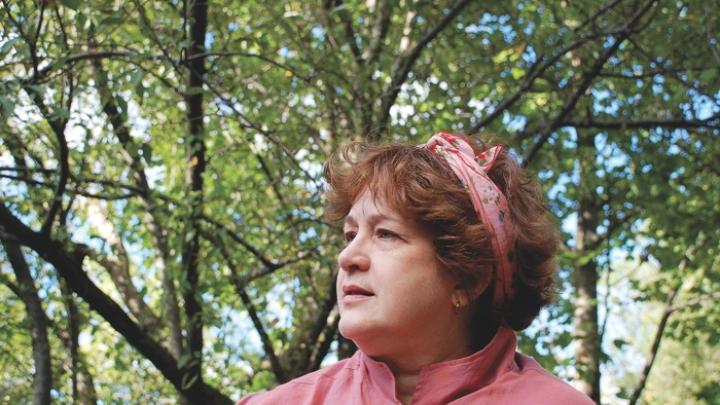“Oh, I’m a romantic, but a heartbroken romantic--and noir, deeply noir,” says poet April Bernard ’78, with a full-throated laugh. Then she explains: “Noir is romanticism embittered. The life of feeling that has been betrayed leads to the attitude and genre of noir. No one who loves noir is a cynic--cynics never believed in anything in the first place. People who love noir are disillusioned romantics. You couldn’t have Raymond Chandler, James M. Cain, and Dashiell Hammett unless you had the Romantics: the belief that feeling is primary and expressing feeling will lead you to spiritual enlightenment. When you find out that it doesn’t, you end up in a place of noir.”
Consider her poem “To the Knife,” in which she mentions Alfred Hitchcock’s 1946 film
“…Notorious, where I discovered myself
a long time ago, before I learned the
finish of the dance
could never be a box-office-pleasing
slow dissolve to kissing.
No; my dance like theirs properly never
ends, it is a danse
apache to the death, so much violence to
reason in lovers kissing
and sighing, because they love because
it’s impossible,
and pretending a happy ending is just an
excuse for more kissing.
This poem, with others in her most recent book, Romanticism (2009), embraces the irrationality of both romanticism and noir: “They are both emotional reactions to the world. Neither is very smart,” she says. Yet, in this collection, her fourth, “The impulse behind the poems is to experience extremities,” she observes. “Shelley wrote, ‘I fall upon the thorns of life; I bleed!’ And I said to myself, ‘Why can’t I say that?’ How do I do that? So I decided to write poems interrogating language, exploring modes of romanticism. There is tremendous pain in these poems and I didn’t know how to express it any better.”
Take the ending of “Romance”:
…Most of what I imagine,
what I want, is small: Hands with
mine in the sink, washing dishes,
the smell of wool, feet tangling mine in
bed. I knowthe gods punish the proud, but I do
it is not humble to ask, every minute or so, for happiness.
not yet know
why they punish the humble.
Although after all
Bernard is now in her second year as director of creative writing at Skidmore, where she also teaches literature. (Her own mentors at Harvard included Robert Fitzgerald and Elizabeth Bishop.) Previously, she taught for a decade at Bennington. (She still lives in Bennington, Vermont.) Her first book, Blackbird Bye Bye, won the Walt Whitman Award from the Academy of American Poets; current U.S. poet laureate W. S. Merwin declared it the work of “a poet of obvious gifts and power and ambition, unsparing and brilliant.”
She’ll admit to the “intellectual ambition” of her work: “It is not just about ‘me.’ I’m interested in writing in a way that reaches beyond the subjective and personal to something greater. That’s what all serious art is for: reaching beyond the self.” While writing Romanticism, she reached for a lot of Henry James (a “late Romantic,” she says, who appears more than once in the poems), listened to lieder, and heard plenty of opera.
Yet the sorrow and disillusion in the book are “tempered with aesthetic and intellectual playfulness,” Bernard says. “I’m playing a game with readers and at the same time engaging their emotions and wits.” In one case, she brings together the unlikely duo of Roy Orbison and John Milton in a poem that mixes tongue-in-cheek celebration (“Someone will return a phone call today!”) with the feeling of waking from a dream to realize, crestfallen, that a lost love is not present after all. Language, she finds, can help melt desolation: “Truth telling, saying it as exactly as I can, provides a form of refreshment.”








